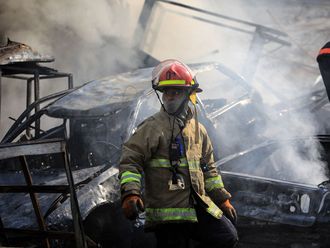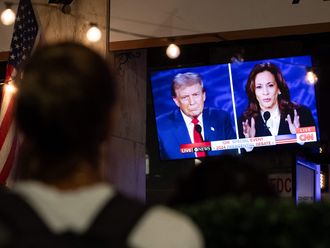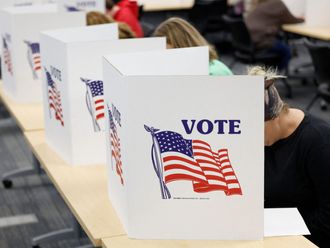Sulaimaniya, Iraq: Iraqi President Jalal Talabani was to return from months of treatment abroad, with his crisis-hit country on the brink of breakup but his native Kurdistan buoyant with statehood hopes.
“President Talabani is coming home on Saturday July 19 after receiving successful health treatment in brotherly Germany,” his Patriotic Union of Kurdistan said on Friday.
The PUK said Talabani, due to fly into his Kurdish fiefdom of Sulaimaniyah, would resume his duties as head of state, in a statement also confirmed to AFP by his son Qubad.
While most of Iraq’s political power lies with the prime minister’s office, the 80-year-old Talabani was long seen as a key mediator between Iraq’s feuding factions.
But many observers now cast him off as a spent force, both physically and politically, with his long-time rival Massoud Barzani presiding over the destiny of the autonomous Kurdish Regional Government.
Talabani will return to Iraq on the eve of a deadline for parliament’s various blocs to agree on candidates for his job, the latest step in what has been a protracted and tumultuous process to renew Iraq’s leadership following April elections.
However there was little expectation he would seek another term.
“I really do think this is a post-Talabani era. I’ve stuck my neck out there, but I haven’t heard any Iraqis talking about him in any way being president,” said Toby Dodge, director of the London School of Economics’ Middle East centre.
According to an unofficial power-sharing deal struck after the US-led invasion of Iraq in 2003, Iraq’s president should be a Kurd, the premier a Shiite and the parliament speaker a Sunni Arab.
Iranian connection
Iraq’s minority Kurds, who have enjoyed autonomy from Baghdad for more than two decades, significantly enlarged their would-be independent state last month when they seized long-disputed territory.
The highly-efficient peshmerga force took advantage of the vacuum left by federal troops retreating in the face of a lightning offensive launched on June 9 by militants.
As the Islamic State of Iraq and the Levant group conquered large swathes of land in Iraq’s north and west, peshmerga units took control of the city of Kirkuk and surrounding oil fields, both seen as essential in Kurdish dreams of statehood.
Barzani, who once fought a bitter internecine war against Talabani for supremacy in the Kurdish rebellion, has blamed Prime Minister Nouri Al Maliki’s Shiite-dominated government for the collapse of the Iraqi army and the rise of sectarian tension.
Al Maliki has accused the Kurds of undermining national unity, taking advantage of an offensive by a group known as the most extreme in the recent history and even of harbouring some its operatives.
It was unclear to what extent Talabani’s return could weigh in on the latest crisis, which the United Nations says has left thousands of civilians dead and forced more than 600,000 people to flee their homes.
However, he could help de-escalate tensions between Baghdad and Kurdistan by tempering Kurdish ambitions for a referendum on independence, following calls earlier this month by Barzani to prepare for one.
Turkey is said to have softened its stance towards the idea of a Kurdish state, but fellow neighbour Shiite Iran is unlikely to condone the breakup of Shiite majority Iraq.
“Talabani was the key interlocutor between Iran, Kurdish politics and Baghdad,” Dodge said.
“So Talabani’s return may well be the Iranians encouraging the PUK to step up and fight against Barzani’s independence plans.”
Jihadist attack
Al Maliki controversially is seeking a third term and his coalition comfortably won April polls.
But violence has since escalated and many, including within his own alliance, see his replacement as essential to national reconciliation efforts.
In a Friday sermon delivered by one of his spokesmen in Karbala, the Iranian-born Grand Ayatollah Ali Al Sistani - Iraq’s most revered Shiite cleric - appeared to lean in the same direction.
“The new government should have broad national acceptance and be capable of solving the crisis in the country and correcting the mistakes of the past,” he said.
Al Maliki on Friday held talks with the secretary of Iran’s Supreme National Security Council, Ali Shamkhani, whose country has backed his coalition and provided military assistance against extremists.
On the battlefront, Islamic State fighters launched a mortar attack on a police checkpoint near Balad, some 70km north of Baghdad, killing six people including three policemen, police said.
An attack was also reported on Dhuluiyah, a nearby town whose capture would also significantly increase the risk of a militant onslaught on the capital.












